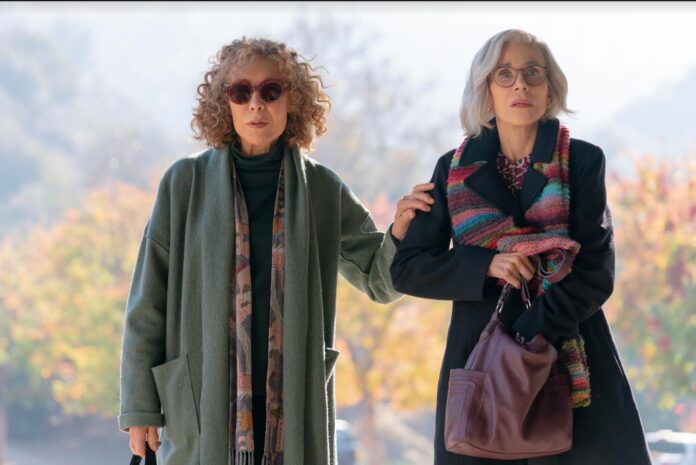The pairing of Lily Tomlin and Jane Fonda is always promising, and their latest endeavor, “Moving On,” has promise too. But this modest film, which opens March 17 in area theaters, is pretty much a big screen sitcom with a halfway decent premise and some awkward tonal shifts.
Claire (Fonda) and Evelyn (Tomlin) reunite after decades apart at the funeral of their mutual friend, Joyce, whom they knew at college. Claire, who flew in from Ohio, greets Howard (Malcom McDowell), Joyce’s widower, not with sympathy, but with the threat, “I’m going to kill you this weekend.” What transpired that Claire has been waiting 46 years to exact revenge on Howard becomes clear over the course of the film.
Writer/director Paul Weitz tries to balance Claire’s motivation, a very serious issue, with off-beat humor, to make it more palatable. The extent he succeeds is all courtesy of Lily Tomlin. Interrupting Howard’s eulogy, or dropping a bombshell at Joyce’ wake, Tomlin’s Evelyn delivers the film’s zingers with characteristic panache. The actress is not playing kooky here as she did in “Grace and Frankie.” Instead, Tomlin is more of a cousin to the sassy character she played in “Grandma,” her last collaboration with Weitz. She gets all the best lines, such as an exchange she has with Walter (Vachik Mangassarian), who has a room in the independent and assisted living facility where Evelyn resides.
The comment involves Walter’s grandson, James (Marcel Nahapetian), a genderqueer youth whom Evelyn gives some clip-on earrings to and encourages to dress up if he so desires. This is a nice subplot, and a later scene where Evelyn encounters James’ parents (Eddie Martinez and Santina Muha) drives home the film’s points about the value of self-expression for queer youth. It is gratifying that the film includes these scenes.
Evelyn, it is revealed, is also queer, and when she discloses that she had married a woman named Annette, Claire is surprised, but reacts kindly. Evelyn drolly responds, “I’m glad you approve.” The film could have used more of these kinds of interactions between Tomlin and Fonda because the actresses have a chemistry from years of working together. Alas, the film keeps them apart for long stretches.
“Moving On” is best during the hangout scenes because they allow the characters to charm and develop. Evelyn’s remarks about aging, or a speech she has about where she is in her life generate pity. But she also reveals a steeliness that is endearing. Likewise, a private moment in a hotel room, where Claire releases her anxiety and frustration at her situation is oddly moving.
In contrast, the murder storyline is merely a lame excuse to create darkly comic moments that, more often than not, fail to land. A sequence early in the film has Claire stealing a knife from the kitchen during the wake to use to attack Howard. But, of course, she is sidelined by various people who need or notice the knife, thwarting her efforts. The bit lacks tension, even if Weitz films Claire moving in slow motion towards Howard with the intent to kill.
Likewise, Claire’s efforts to secure a gun to do the deed are predictable. First, she visits a gun shop, but is stymied because the salesman (out actor Haaz Sleiman) can’t sell her a piece because she doesn’t have a California driver’s license. When Evelyn later sources a gun for Claire, it isn’t quite the weapon she expected. The humor in these moments feels sit-comic. To get the gun, Evelyn has to trade bacon, which Claire, a pescatarian, has to procure after a night with her ex-husband, Ralph (Richard Roundtree, suave as ever). It is a bit strained.
Claire’s visit with Ralph is rather sweet as they reminisce, but then he presses her about what happened that caused her to leave him. Claire teases out the truth — it is the reason why she wants to kill Howard — but she never clearly states it. It is not difficult to guess her trauma, but rather than address the elephant in the room, Ralph invites Claire to spend the night, which she does. Cue both a Viagra reference (de rigueur for any film about people of a certain age having sex) as well as a condom joke — because, ha ha, Claire doesn’t want to get knocked up.
Weitz does not need to try so hard with his humor. The film scores easy laughs whenever Tomlin deadpans about the food in the independent living center tasting like cardboard, which she does at least twice.
“Moving On” finally gets around Claire and Howard having a confrontation where she tries to set the record straight regarding the event that changed her life. The film addresses the issue with (pardon the pun) grace, even if it undersells the impact of what occurred. Fonda is best in her dramatic moments, as is McDowell, whose anger rises at Claire’s accusations. There is some real friction in this scene and to the film’s credit, Howard is hateful. Both Fonda and McDowell fare less well with their comedic scenes, some of which are slapsticky.
Weitz never quite balances the humor with its darker storylines as the film builds to its contrived and predictable ending. The queer inclusivity is a plus, and it is great to see the performers playing to their strengths, but “Moving On” is too uneven to fully succeed.
